On Day 2, on March 28th 2025, participants had the opportunity to participate at the parallel sessions and visit some projects funded by the Interreg Italy-Slovenia Programme. The visits provided a direct insight into the tangible results of cross-border cooperation, highlighting successful initiatives in the areas of environmental sustainability, technological innovation, and cultural development.
Below you can find the details on the six parallel sessions and the related project visits:
Governance models for tourism & culture in Interreg Programmes
As part of the annual Interreg GO! event, on March 28, 2025, was held the parallel session titled “Governance models for tourism & culture in Interreg Programmes”. The session was organized by the Interreg VI-A Italy-Slovenia Programme and Interact. The session and the following study visit to projects were held at the Sežana Botanical Garden (Slovenia).
The parallel session
The session aimed to analyze how Interreg programmes have integrated tourism and culture with strategic objectives. Participants learned about various governance models developed for the implementation of projects in the culture and tourism sectors, examining their long-term impact, sustainability, promotion, capitalisation, and legacy of project results.
The session represented an importan opportunity to provide useful recommendations to other Interreg programmes across Europe, fostering knowledge exchange and inspiring future synergies and collaborations to enhance tourism through regional growth.
Speakers involved in the parallel session:
• Dominik Hartmann | Interreg Germany/Bavaria – Austria;
• Silvia Comiati | Interreg Italy – Croatia;
• Artenida Duraku | Representative of the IPA States (TBC) – Representative of the Ministry of Tourism Of Albania;
• Co-organizer from Interact | Ivana Lazic;
• Co-organizer from the European Commission | Robert Spisiak.
The study visit
The study visit was presented by Jernej Grubar, from the Sežana Botanical Garden (Botanični vrt Sežana), with a contribution from Andreja Grom regarding the Interreg Italy-Slovenia Programme. During the study visit, four projects were presented and visited, all focused on promoting cross-border governance for the geological region of the Karst Plateau:
• KRAS-CARSO II | Italy-Slovenia
• GeoKarst | Italy-Slovenia
• KRAS-CARSO | Italy-Slovenia
• KRASn`KRŠ | Slovenia-Croatia
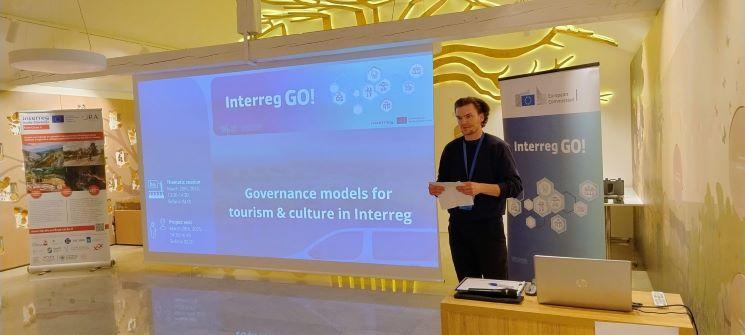
The key message emerging from the visit
The wide spread of tourism within the projects of various Interreg programmes highlights its strategic role as a tool for growth. This opportunity translates into promoting natural, cultural and historical heritage, bringing benefits to both the territory and its population. The leitmotiv of the visit was to encourage sustainable tourism, showcasing lesser-known destinations in order to face and mitigate the challenges posed by mass tourism. The experience shared by the project from the different programmes presented (Interreg Germany/Bavaria, Interreg Italy/Croatia, from the Albanian Ministry of Tourism, and Interreg Italy-Slovenia) demonstrated the significant positive impacts that these initiatives can generate in local areas. Participants had the chance to admire and appreciate the interactive room within the botanical garden and the in-depth documentary about the Karst region, both outcomes of actions implemented through Interreg projects aimed at creating models for sustainable tourism and cultural management. The shared message on the sidelines of the meeting was the hope of being able to promote further sustainable tourism actions, respecting the environment, fostering social inclusion, and transforming competition within the tourism sector into collaborative actions and mutual cooperation.
The People-to-people recipe – Combine smart ideas, small funds and simple rules to get smiling faces
As part of the annual Interreg GO! event, on March 28, 2025, was held the parallel session titled titolo “The People to people recipe – Combine smart ideas, small funds and simple rules to get smiling faces”, organized by the Interreg VI-A Italy-Slovenia Programme and Interact. Both the parallel session and the study visit took place at Frančiškanski Samostan Kostanjevica Monastery of Nova Gorica.
The parallel session
The parallel session aimed to explore how Interreg programmes have effectively integrated small projects, with semplified regulations, with strategic objectives. Participants learned about examples highlighting the implementation of people-to-people projects, examining their long-term impact, sustainability, promotion, capitalisation, and legacy of project results. During the event, a motivational speech emphasized how citizen involvement is crucial for bringing people from cross-borders areas closer together to build peace. The session also provided important recommendations for other Interreg programmes across Europe, fostering knowledge exchange and inspiring future synergies and collaborations.
The speakers involved in the parallel session were:
• Gina Mcintyre, Interreg PEACE Plus
• Mauro Novello, IPA South Adriatic programme
• Friedrich Veider, CLLD area „HeurOpen, Interreg Italy-Austria
• Aljosa Sosol, Interreg Italy-Slovenia
The study visit
After the parallel session, the study visit was held, showcasing projects funded by the Small Project Fund (SPF) GO! 2025. This fund is a tool financed by the Interreg Italy-Slovenia Programme, whose main objective is to prepare the cross-border territory for the European Capital of Culture Nova Gorica-Gorizia 2025. Specifically, participants discovered the following two projects:
• WALK 2 SPIRIT | Italy-Slovenia
• Vina prijateljstva & miru | Italy-Slovenia
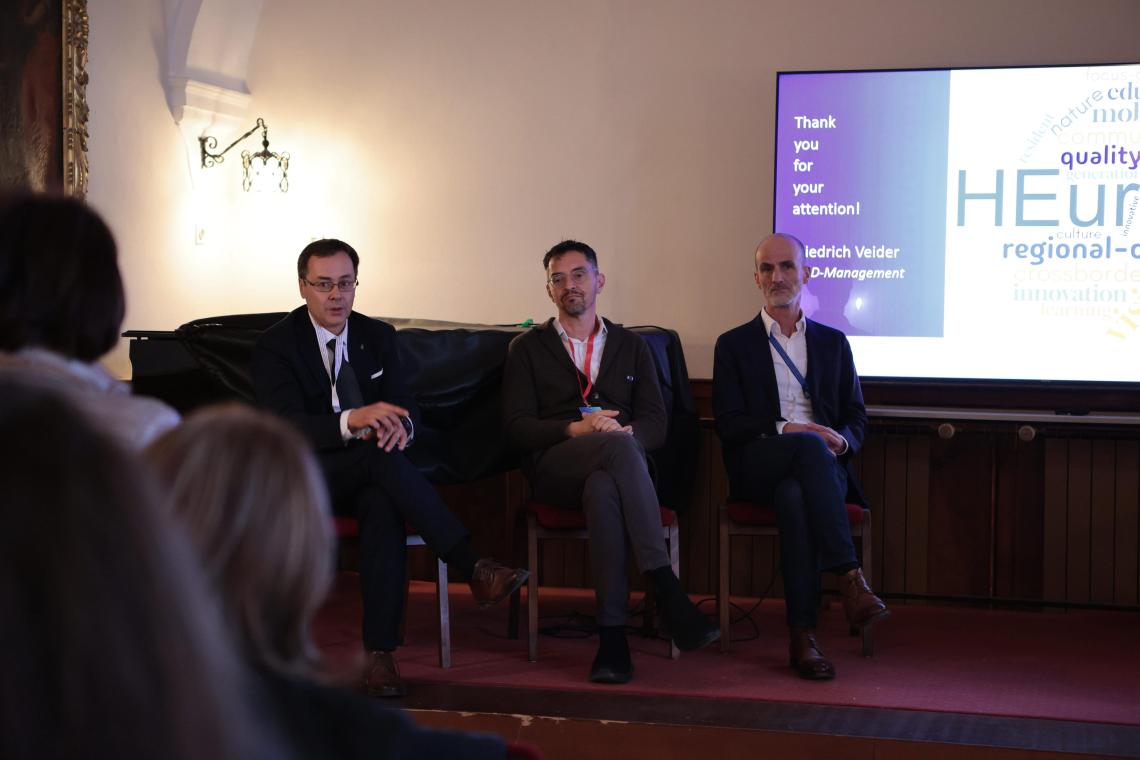
The key message emerging from the visit
The visit highlighted that, today, it is crucial to take action to promote peace, address conflicts, and strenghten cooperation. Involving young people in this field appears fundamental. Interreg P2P projects are fundamental for increasing cross-border cooperation, building trust, and engaging citizens. A partnership between civil society, municipalities, and programme bodies is necessary, remembering that the actions to be implemented work territorially within the regional context, and therefore a one-size-fits-all approach cannot be effective. During the event also emerged the current challenges in cross-border cooperation (such as linguistic and cultural barriers, differences in national systems, and involvement of new communities), which can be mitigated through the following solutions: the use of interpreters and strong communication, the creation of local partnership, and continuous outreach by providing tailored information. Regarding the post-2027 period, it emerged that the Interreg programmes should focus on inclusivity, reducing bureaucracy, and it would be advisable to share with beneficiaries the concrete outputs and evidence of the benefits that the actions to be implemented can generate for society.
Powerpoint parallel session P2P
Disaster Risk Management | Disasters knows no borders: Interreg’s role in supporting disaster risk management
As part of the annual Interreg GO! event, on March 28, 2025, the parallel session titled “Disaster Risk Management | Disasters knows no borders: Interreg’s role in supporting disaster risk management” was held. The session was organized by the Interreg VI-A Italy-Slovenia Programme together with Interact. The parallel session was held in Mestna občina Nova Gorica, while the study visit took place at the Civil Protection Center in Palmanova.
The parallel session
The session examined the relevance of Distaster Risk Management (DRM), which is the key to addressing extreme climate events such as devastating floods, heatwaves, and forest fires. Additionally, new geopolitical, technological, and health risks further increase the need for effective disaster risk management. The Interreg programme supports DRM initiatives to foster cross-border and transnational collaboration in this field.
The aim of the session was to demonstrate, within a context where threats posed by environmental disasters are becoming increasingly frequent, the importance of collaboration, innovation, and the use of nature-based approaches to enhance resilience. Participants had the chance to learn about examples of DRM implemented in several Interreg projects, which support cities and regions of the European Union in tackling current and future disasters.
The session also was an opportunity to promote dialogue among Interreg programmes, European Commission and practitioners on the current challenges to be addressed.
Speakers involved in the session included:
• Nicola Tollin, Simona Pohlova, Kirsti Mijnhijmer, Horst Schindler, Juan Picos Martín; Aleš Vodičar, Aldo Primiero, Mojca Premrl, Simon Vendramin, Nelly Zanette e Alessandro Gallo
• Co-organizer from Interact: Tomasz Petrykowsky, Guilherme Johnston
The study visit
Following the parallel session, the study visit took place, during which three projects were presented and visited, all focused on natural and climate risk management:
• CROSSIT SAFER
• KARST SAFE
• IN4SAFETY
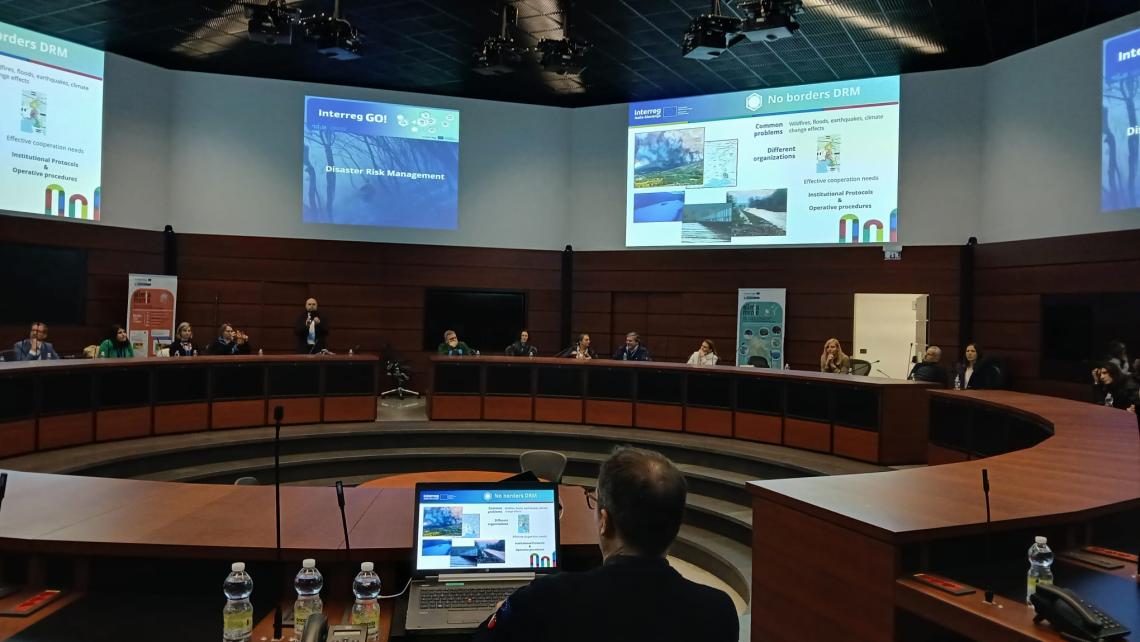
The key message emerging from the visit
The political perspectives at the European level and the impact of the projects were highlighted, emphasizing the importance of further cross-border and transnational collaboration in disaster risk management. Synergies with other funding mechanisms can enhance the effectiveness of managing these risks. Innovative solutions in this field play a crucial role and should be promoted through the Interreg programmes. It is essential that Interreg programmes intensify cooperation on this issue and have adequate support tools. Additionally, integrating climate change adaptation measures into cooperation initiatives for disaster and risk management is vital. It is proposed that an Interreg mechanism be created for sharing opportunities among programmes, ensuring the continuity of discussions and exchanges on disaster risk management even beyond the emergency events.
PowerPoint parallel session Disaster Risk Management
Financing Research and Innovation, how Interreg adds value
As part of the annual Interreg GO! event, on March 28, 2025, the parallel session titled “Financing Research and Innovation, how Interreg adds value” was held. The session was organized by the Interreg VI-A Italy-Slovenia Programme together with Interact. The parallel session took place at Kulturni Dom in Gorizia, while the following study visit of the projects was held at Primorski Technological Park Vrtojba in Nova Gorica.
The parallel session
The session has highlighted the support of Interreg Programmes for research and innovation during the 2021-2027 programming period, focusing on how the programme funds and implements projects in this field.
The session was also an opportunity for exchanging experiences on different support models, funding approaches, and strategic synergies with other national and EU programmes. Discussions during the event analyzed how the Interreg Programme contributes to fostering innovation, strengthening regional ecosystems, and ensuring long-term impact.
An important point that emerged from the session is the need to define new approaches for future calls and programming periods. These approaches should take into account constantly evolving needs, new ways to enhance innovation, and improve dialogue among all involved partners.
Several speakers were involved during the parallel session:
• Blagovestka Riiser | EU Commission
• Valeria Cibrario | Interact
• Moderator: Ilze Ciganska | Interact
• Laura Bobarnac | Interreg NEXT Black Sea Basin
• Elena Borghetti | Interreg France-Wallonie-Vlaanderen
• Marta Ślężak-Warszycka | Interreg Baltic Sea Region
• Egle Spudulyte | EU Commission
The Co-organizer were:
• Valeria Cibrario, Ilze Ciganska e Evasen Naidoo from Interact;
• Francesco Papais e Katja Hrvatic from the Interreg Italy-Slovenia Programme;
• Blagovetska Riiser e Birgit Sandu Gociu from European Commission.
The study visit
To welcome the participants of the study visit were Bojana Cipot, head of international projects at PTP (Primorski Technological Park Vrtojba) and Tanja Kožuh, director of PTP. During the visit three projects were presented, all implemented in the field of research and innovation:
• DIVA| Italy-Slovenia
• NANO-REGION| Italy-Slovenia
• EUSAIR POPRI Youth
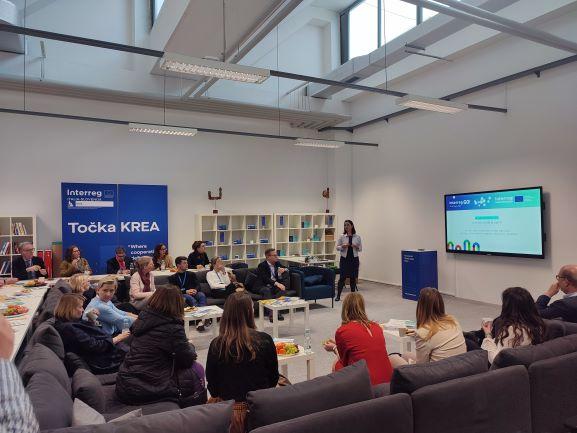
The key message emerging from the visit
In the current context, characterized by rapid geopolitcal, technological, and social changes, it is essential to build and invest in resilient regional ecosystems by funding innovation. The importance of collaboration in research and innovation was emphasized, demonstrating how cooperation in Interreg projects has successfully facilitated the dissemination and adoption of innovation in regional contexts. The distinctive feature of Interreg programmes is their focus on territorial and cross-border dimensions, adopting a localized approach based on partnership. This approach implements innovations by encouraging governance models suited to local needs, making innovation more accessible. Innovation is not limited to research and product development, but it includes also the process innovations. Additionally, the significant support provided by platforms and tools that enable to identify and leverage cooperation opportunities has been highlighted.
PowerPoint parallel session Financing Research and Innovation
Building a Greener Europe through Water Resilience and Integrated Management
As part of the annual Interreg GO! event, on the afternoon of March 28, 2025, the parallel session titled “Building a Greener Europe through Water Resilience and Integrated Management” was held. The session began at Kulturni Dom in Gorizia with a significant discussion on the sustainable management of water resources, followed by a study visit to the projects AQUAVITIS and IRRIGAVIT – funded by the Interreg Italy-Slovenia Programme – at the historic Villa Nachini Cabassi in Corno di Rosazzo, in the heart of the Colli Orientali of Friuli.
An opportunity for dialogue on water resilience and integrated governance
The session aimed to explore how Interreg programmes integrate environmental sustainability into water management strategies and to showcase innovative governance models developed for project implementation in this field. Participants analyzed concrete examples of initiatives funded by the Interreg Italy-Slovenia Programme, including the standard project AQUAVITIS (2014-2020 programming period), which is focused on the protection and sustainable use of water resources in the cross-border area, and its related capitalization project IRRIGAVIT (2021-2027 programming period), which aims to promote innovative technologies and practises for sustainable and resilient irrigation management in the Colli Orientali region.
The session provided a significant opportunity to share experiences and results, examine the long-term impact and sustainability of the projects, and offer useful recommendations for other Interreg programmes acrosse Europe, as well as foster knowledge exchange and inspire future cooperation synergies.
The role of viticulture in the Colli Orientali and climate challenges
From Kulturni Dom in Gorizia, participants moved to Corno di Rosazzo, where at Villa Nachini Cabassi, Paolo Sivilotti, Klemen Lisjak, Mariano Paladin, Cristina Specogna, a wine producer and representative of the Consorzio Colli Orientali – a partner of in the IRRIGAVIT project – highlighted the critical issues related to climate change affecting the area: rising temperatures, decreasing rainfall, and the increasing frequency of extreme weather events threaten both the quality and the quantity of grapes, with direct consequences on local wine production.
In an territory where irrigation has historically been limited by water shortage, the AQUAVITIS and IRRIGAVIT projects are essential tools for innovating agricultural practises and promoting integrated and sustainable water management, strengthening both the environmental and socioeconomic resilience of the cross-border area.
The visit concluded with a tasting of local wines at Villa Nachini Cabassi, a moment of conviviality that highlighted the connection between environmental protection, territorial development, and enogastronomic tradition.
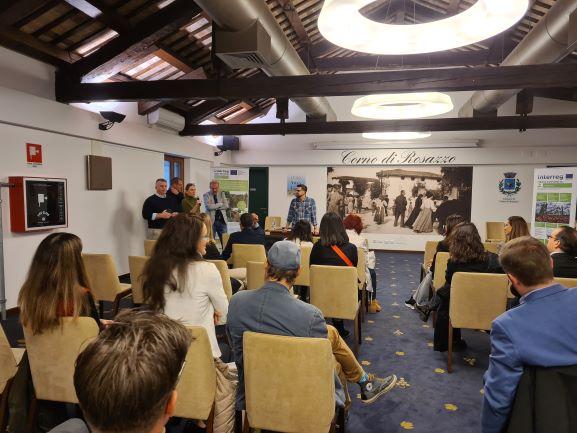
Conclusions and perspectives
The meeting confirmed the importance of cross-border cooperation in addressing shared environmental challenges, emphasizing the key role of Interreg as a driver of innovation and sustainability. The knowledge exchanged and the best practices emerged represent a valuable heritage for strenghthening inegrated governance and promoting increasingly resilient water resources management systems across Europe.
PowerPoint parallel session Greener Europe
Health | Enhancing Cross-Border Health through Interreg: Bridging Gaps for Resilient Communities
As part of the annual Interreg GO! event, on March 28, 2025, the parallel session titled “Health |Enhancing Cross-Border Health through Interreg: Bridging Gaps for Resilient Communities” was held. The session was organized by the Interreg VI-A Italy-Slovenia Programme together with Interact. The event took place in Gorizia, specifically the session was held at Kulturni Center Lojze Bratuž, while the following study visit at Casa della Salute della Donna, dell’Infanzia e dell’Adolescenza.
The parallel session
The objective of the session was to analyze how Interreg programmes integrated the theme of health into their strategic objectives. The audience, actively engaged through real-time surveys on key contributions and barriers to Interreg health cooperation, had the opportunity to explore various governance models used to implement health projects. The session also examined the long-term impact, sustainability, promotion, capitalization, and legacy of project results. During the session, speakers discussed the benefits of cross-border healthcare cooperation, such as patient mobility, digital innovation, emergency response, and addressing healthcare staff shortages. At the same time, significant challenges emerged: legal obstacles, administrative complexity, poor integration with national policies, and the tendency to create “mirror projects” rather truly integrated services between neighboring countries.
Several speakers were involved in the session:
• Mercedes Ancitores | Interact;
• Valeria Cenacchi | European Commission – DG Regio, health referent for the Border Focal Point Network;
• Caitriona Mullan | senior expert at DG Regio;
• Kathrin Huber | Head of the Managing Authority for Interreg Austria–Czechia;
• Tomasz Jedrzejewski | Deputy Head of the Joint Secretariat for Interreg NEXT Poland-Ukraine;
• Alexandre Colombani | Head of Unit on Development and Communication for Interreg North-West Europe.
The study visit
After the parallel session, participants moved by bus to take part in a study visit, during which three projects, implemented in the healthcare sector, were presented and visited:
• Casa delle Donne Project, presented by Giulia Bonn (EGTC GO!)
• Autism Project, presented by Lara Devetak (EGTC GO!)
• Collaboration with Šempeter Hospital, illustrated by Tomaž Konrad (EGTC GO!)
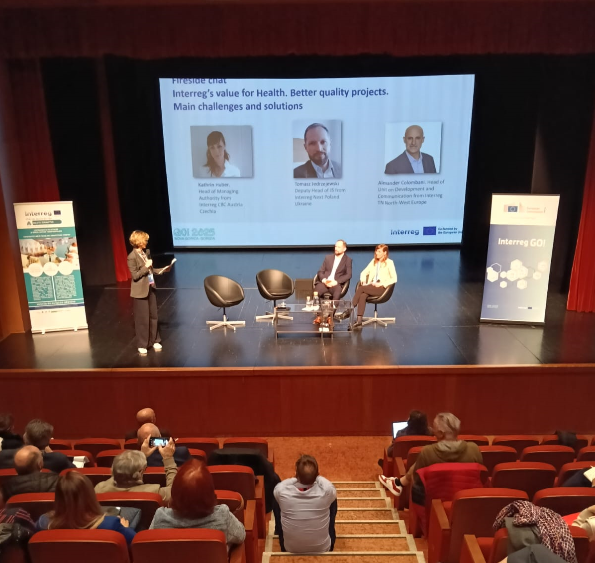
The key message emerging from the visit
A strong message emerged, highlighting the importance of the Interreg Programme: it is much more than just a funding tool, it is a concrete opportunity to build more resilient, inclusive, and coordinated healthcare systems in cross-border regions. The cooperation implemented by Interreg programmes is an added value, insofar as it enables the creation of platforms for shared solutions and mutual learning.
However, for these results to endure over time, continuous investment, greater integration with national policies, and special attention to the sustainability of projects are essential. Significant obstacles remain, including complex legal and administrative barriers, differences in healthcare systems, and the lack of data sharing, intecultural competencies, and coordination among stakeholders. At the event participants learned about the concrete effects of Interreg cooperation in the healthcare sector, such as support for vulnerable groups, the exchange of best practices, and the integration of Italian and Slovenian healthcare services.